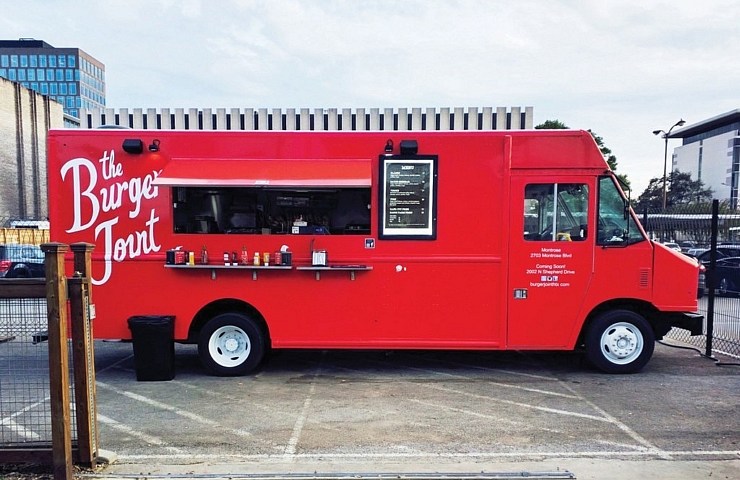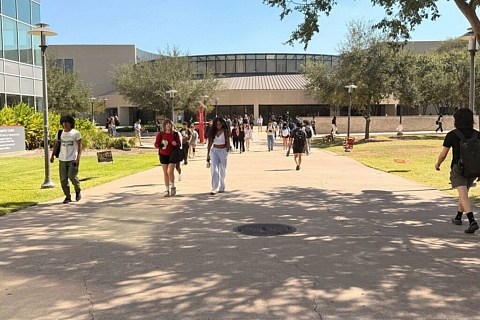Approaching The Burger Joint at UH campus early Wednesday, it’s easy to hear jokes and laughter of some five-or-so employees packed into the truck. The cashier carefully slides past the two men preparing the food practically back to back. Even though it’s only 11 am, a single student is already waiting patiently for their order.
Matthew Pak, the owner of The Burger Joint, has two trucks in Houston, as well as a brick-and-mortar location on Montrose. He’ll be expanding to a second Houston location soon, which is no small feat in the food industry, and speaks to the success of his business. A veteran food-truck owner, Pak has spent seven years building up a business that he can be proud of.
“I first opened Koagie Hots,” Pak said. “Koagie Hots was like a Korean fusion, Korean barbeque cheesesteak truck. I opened that, ran that and then opened another truck called The Golden Grill. We also ended up taking over a truck called Coreanos, which is still open.”
Even though Koagie Hots and The Golden Grill are closed, and Coreanos was sold last year, The Burger Joint was started three years ago, and has been expanding ever since. For Pak, it’s his dream to be a restaurant owner finally realized.
“I was always in the food business, my dream was to always open a restaurant, whether it was fast-casual, or fine dining,” Pak said. “Food trucks are a good way to start with a low amount of money. It’s quicker; a good way to test concepts. We tested Koagie Hots, The Golden Grill, and a bunch of different concepts. It didn’t really necessarily evolve into brick-and-mortars, but we got to The Burger Joint, which obviously did. I think, ultimately, it’s a good way to start a business for less risk.”
Even though those looking to get into the food truck industry don’t have to worry about high overhead costs and enjoy a smaller upfront investment, there are definitely enough challenges to make up for it. Maintenance and upkeep of the trucks is often the costliest challenge, especially because the trucks are always on the go.
“You’re running off of like gas generators; everything requires so much maintenance and things break down and there’s traveling. A lot of food trucks do stuff in the suburbs and trucks break down on the way to big events. It’s a really high-stress business to open,” Pak said. “It’s nearly impossible to get people out there to do maintenance on a food truck last minute.”
Other issues include storing food and retaining staff, which can be especially hard in Houston.
“No matter how many AC units you put in a truck, they’re not ideal working conditions in a kitchen, in a parking lot, open 12 to 15 hours a day,” Pak said. “When you open a food truck, you find yourself shopping every single day, for every single event. It’s not like all of these food trucks have restaurants to pull from. Storage is a huge issue for most for most of the trucks out there. You can only fit a day’s worth of food on the truck, if that.”
In spite of the challenges, food trucks have become increasingly popular over the last several years, especially for larger corporate events and music festivals. Pak is adamant that’s where the future of food trucks lies, because people always like to have a lot of different options and variety.
“For an example, like with weddings. It’s a good option versus full set-up buffet catering. You call a food truck, they don’t have to bring anything, they don’t need space. They just bring the food truck, they can park, put on their own power, everything,” Pak said. “You can bring in ten different concepts for a huge corporate event. It gives all of their tenants, staff and workers options to eat. Even older companies are bringing in food trucks.”
Pak owns both a restaurant and the trucks, but in terms of regulation, sometimes the two don’t quite get along.
“A regulation that I don’t agree with is trucks aren’t allowed to have seating and chairs within a 100 feet of the food truck, which is crazy,” Pak said. “I’m not against anything that restaurants are worried about, but if seats around the food truck are affecting your business to the point that your business is failing, then it’s not the food truck affecting your business; it’s your business.”
Matthew Pak has ridden his food truck to success, but feels that the time to join in on the trend may have already passed due to the huge influx of competition in later years. While he’s not certain the market is going to keep expanding, the way that we eat at events has been changed permanently.
“As far as the catering side of it, the private events, the big events, I think it will stay like this forever.”




Recent Comments